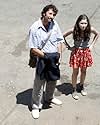Füge eine Handlung in deiner Sprache hinzuA father and his daughter, during the 2006 war between Israel and Lebanon.A father and his daughter, during the 2006 war between Israel and Lebanon.A father and his daughter, during the 2006 war between Israel and Lebanon.
- Auszeichnungen
- 4 Gewinne & 14 Nominierungen insgesamt
Fotos
Handlung
Ausgewählte Rezension
Saw this movie last night. Came away with a bit of a bad taste.
Most importantly, the film perpetuates a number of damaging stereotypes about fathers: a trend that is even more pronounced in Israel than in the U.S. The protagonist is a never-employed man- child father who spends most of his time chasing impractical dreams. He has no concept of responsibility, either for his own life or that of his child.
This is heightened by a number of scenes in which the child, a young teenager, is placed in a clearly parentified role where she demonstrates, at every turn, that she is both smarter and more sophisticated than her poor old dad.
The cycle is completed when, in one scene, the wife of a seemingly high functioning character (who spends most of her time as a dilettante painter while benefiting from her husband's seemingly earned wealth) essentially describes all men as childish and prone to foolishness. So, now, all men, regardless of whether they take care of their life-responsibilities, show up for regular army reserve duty and act charitably towards others are lumped in the same group as the loafer-father.
While these stereotypes may generate some easy laughs, their perpetuation as a societal norm in Israel constitutes one of the main reasons why Israel is one of the few democracies that continues to uphold nearly automatic custody rights for women, why fathers in Israel can be easily convicted and sent to jail without much proof of wrongdoing and why Israel has the second highest average child support obligation among all OECD countries (and which is based on flat numbers rather than income percentages). It is a shame that this film garnered as much critical acclaim as it seemingly does not deserve.
Most importantly, the film perpetuates a number of damaging stereotypes about fathers: a trend that is even more pronounced in Israel than in the U.S. The protagonist is a never-employed man- child father who spends most of his time chasing impractical dreams. He has no concept of responsibility, either for his own life or that of his child.
This is heightened by a number of scenes in which the child, a young teenager, is placed in a clearly parentified role where she demonstrates, at every turn, that she is both smarter and more sophisticated than her poor old dad.
The cycle is completed when, in one scene, the wife of a seemingly high functioning character (who spends most of her time as a dilettante painter while benefiting from her husband's seemingly earned wealth) essentially describes all men as childish and prone to foolishness. So, now, all men, regardless of whether they take care of their life-responsibilities, show up for regular army reserve duty and act charitably towards others are lumped in the same group as the loafer-father.
While these stereotypes may generate some easy laughs, their perpetuation as a societal norm in Israel constitutes one of the main reasons why Israel is one of the few democracies that continues to uphold nearly automatic custody rights for women, why fathers in Israel can be easily convicted and sent to jail without much proof of wrongdoing and why Israel has the second highest average child support obligation among all OECD countries (and which is based on flat numbers rather than income percentages). It is a shame that this film garnered as much critical acclaim as it seemingly does not deserve.
- maxrapaport
- 12. März 2017
- Permalink
Top-Auswahl
Melde dich zum Bewerten an und greife auf die Watchlist für personalisierte Empfehlungen zu.
Details
Zu dieser Seite beitragen
Bearbeitung vorschlagen oder fehlenden Inhalt hinzufügen















